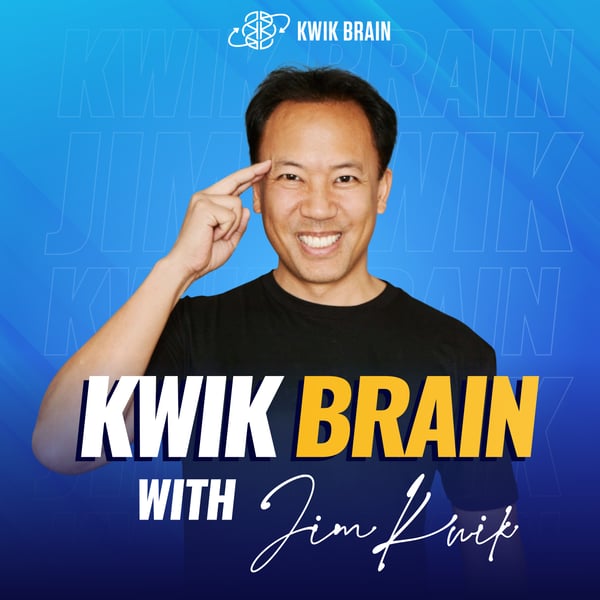Why We Forget & How to Train Your Brain to Remember with Dr. Charan Ranganath
Kwik Brain with Jim Kwik
Jim Kwik, Your Brain Coach, Founder www.KwikLearning.com
4.7 • 5.1K Ratings
🗓️ 15 April 2024
⏱️ 20 minutes
🧾️ Download transcript
Summary
Why do you remember some things and forget others?
When it comes to memory, your brain is programmed to forget. That’s why it’s not only important to train your memory, but understand the complex mechanism of how your brain actually records and retrieves the past. Your memories make you who you are and because of the way your brain transforms memories, you can use them to understand the present and imagine the future.
I’m excited to go on a deep dive into this topic with our guest today, Dr. Charan Ranganath. Dr. Ranganath is a Professor of Psychology and Neuroscience, and Director of the Dynamic Memory Lab at UC Davis. For over 25 years, he’s studied the mechanisms in the brain that allows you to remember past events. He’s here to talk about his brand-new book, Why We Remember: Unlocking Memory’s Power to Hold on to What Matters.
There is extraordinary overlap in the brain between the systems that operate your memory and your imagination. You can use this overlap to make better choices that can lead to better memories, and that in turn, can open new opportunities in your life. Listen in as Dr. Ranganath goes into how the brain records and retrieves the past, and what you can do to make your memory stronger.
Link to Limitless Expanded
Link to Kwik Success Program
Link to Kwik Programs (Use code: PODCAST15)
Link to Show Notes
Link to Kwik Brain C.O.D.E. Quiz
Link to Free Speed Reading Masterclass
If you’re inspired, I want to invite you to join me in my brand NEW 10-day course, specifically designed to boost your productivity. I know it sounds too good to be true, but I give you step-by-step guides using the accelerated learning model to help you get more done and achieve your goals.
Transcript
Click on a timestamp to play from that location
| 0:00.0 | Welcome to QuickBrain. Bites-sized brain hacks for busy people who want to learn faster and achieve more. |
| 0:06.0 | I'm your coach, Jim Quick. |
| 0:08.0 | Free. You're mine. Let's imagine if we could access 100% of our brain's capacity. |
| 0:15.0 | I wasn't high, wasn't wired, just clear. |
| 0:18.0 | I knew what I needed to do and how to do it. |
| 0:20.0 | I know Kung Fu. |
| 0:22.0 | Show me. I know Kung Fu. |
| 0:24.0 | Show me. |
| 0:29.0 | Welcome back Quick Brains. I'm your host and your brain coach Jim Quick. To forget is to be human. |
| 0:32.8 | Yet forgetting is one of the most puzzling |
| 0:35.3 | and sometimes frustrating aspects of the human experience. |
| 0:39.5 | So it's natural to ask, |
| 0:41.5 | why do we remember some events and things and forget others? |
| 0:45.8 | We tend to believe that we can still come out should remember anything we want, but the reality |
| 0:51.8 | is that we are designed actually to forget and so our guest today is |
| 0:58.1 | Sharon Rangana he is a professor of psychology and neuroscience and director of the dynamic memory lab at the University of California at Davis. |
| 1:09.0 | For over 25 years, he has studied the mechanisms in the brain that allow us to remember past events. |
| 1:15.8 | He is also the author of the brand new book, Why We Remember, Unlocking Memories Power to hold on to what matters. |
| 1:25.0 | Welcome to the show. |
| 1:28.0 | Thank you so much for having me, Jim. |
| 1:30.0 | Yeah, so I've been really looking forward to this, really enjoyed your book. |
| 1:32.8 | I highly recommend that our community gets their copy and gets two copies. |
... |
Please login to see the full transcript.
Disclaimer: The podcast and artwork embedded on this page are from Jim Kwik, Your Brain Coach, Founder www.KwikLearning.com, and are the property of its owner and not affiliated with or endorsed by Tapesearch.
Generated transcripts are the property of Jim Kwik, Your Brain Coach, Founder www.KwikLearning.com and are distributed freely under the Fair Use doctrine. Transcripts generated by Tapesearch are not guaranteed to be accurate.
Copyright © Tapesearch 2025.

